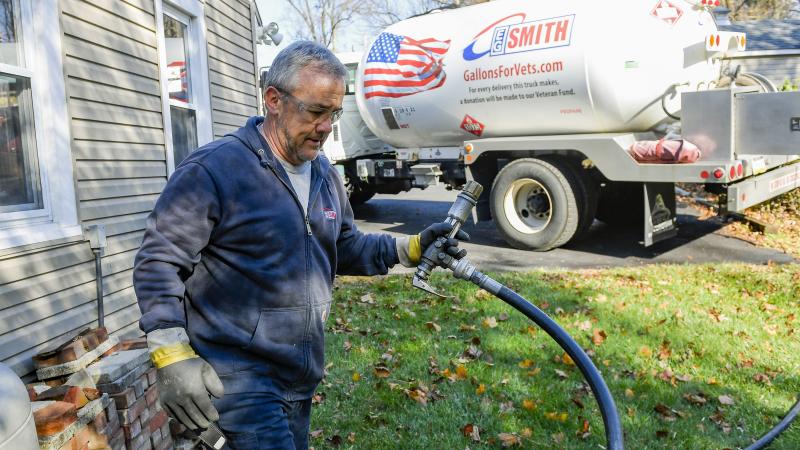Biofuels industry bet on federal mandates to create demand, but now it now struggles to stay afloat
While new refineries haven’t come online since Jimmy Carter was president, some existing refineries have converted over to producing biofuels, which reduced the country’s petroleum refining capacity.
The American Petroleum Institute (API) announced earlier this month that it would be suing the Environmental Protection Agency over the agency’s tailpipe emission standards. Sometimes referred to as an electric vehicle mandate, the standards are expected to force automakers to make 66% of all new car sales EVs by 2032.
Joining the nation’s largest petroleum industry group in suing the EPA was the American Farm Bureau and other agriculture industry groups. While it might seem odd that the ag industry would be concerned about EV mandates, the EPA’s bet on EVs caused a ripple effect across the biofuels refining industry and the farmers that produce its feedstocks.
While the industry hoped for further mandates to boost the market for renewable diesel and biodiesel, the EPA decided to go with electrification instead, leaving the industry in a lurch and the nation with a glut of biofuel products.
“It's always risky to bank on federal policy for your entire business,” Kenny Stein, vice president for policy at the American Energy Alliance told Just The News.
Diminished capacity
A Houston energy company announced this month that it will be building the first major oil refinery in nearly 50 years. Energy Fuel Holdings LLC, according to the Houston Business Journal, is investing $3 billion to $4 billion in the project, which will produce 160,000 barrels per day of gasoline, diesel and jet fuel. There’s a long permitting process ahead, including environmental impact analyses, and the project will almost certainly encounter litigation and protests from environmentalists. Should it come to fruition, it will boost U.S. refinery output by nearly 10-fold.
While new refineries haven’t come online since Jimmy Carter was president, some existing refineries have converted over to producing biofuels, which reduced the country’s petroleum refining capacity.
Renewable diesel and biodiesel produce lower yields than fuels made from petroleum feedstocks, so the market depends on tax credits and mandates. Thanks to the EPA, Wall Street has a lucrative market in credits that refiners receive under the 2005 Renewable Fuel Standard, called Renewable Identification Numbers (RINs), for producing or importing biofuels. This has encouraged refineries to get into the business.
In April, Phillips 66 announced that its Rodeo Renewable Energy Complex in San Francisco had completed a transition away from refining petroleum products to using only renewable feedstocks, and it was producing approximately 30,000 barrels per day of renewable diesel.
Renewable diesel has a few strengths over its petroleum counterpart. The Phillips 66 refinery has been under enormous pressure from California’s anti-fossil fuel politicians to shut down, according to “Doomberg,” a group of analysts who publish their writings on Substack. Climate activists are more accommodating of biofuels. Likewise, no engine modifications are needed to burn renewable diesel, so long-haul truckers can fill up their vehicles and go about their day. Farmers also get a big market for their crops.
These biofuels include biodiesel and ethanol, which are used as blends in petroleum fuels. The federal government began providing subsidies for biofuels back in the 1970s, when the country feared it would run out of oil. Thanks to the Shale Revolution, the U.S. has become the largest producer of oil and gas in the world since 2018, and that concern no longer exists.
“This is a perfect illustration of what [free market economist] Milton Friedman meant when he said there’s nothing so permanent as a temporary government program,” Stein said.
The Renewable Fuel Standard, which was expanded in 2007, mandates increasing volumes of biofuels blended into the nation’s transportation fuel supply. Many refineries retooled to farm the lucrative subsidies to be had for renewable diesel and biodiesel.
Renewable diesel production, according to Reuters, grew by nearly 400% from 791 million gallons per year in 2021 to 3 billion gallons in 2023. The total output capacity for biodiesel and renewable diesel surpassed 5 billion gallons in 2023. By 2025, the output capacity could go as high as 7 billion gallons.
However, the Renewable Fuel Standards program creates a demand of about 4.5 billion gallons per year through 2025. This is below existing domestic production, and that supply doesn’t factor in imports. As a result, prices for RINs tied to biodiesel and renewable diesel fell below 40 cents per gallon in February, down from an average of $1.50 from 2021 to 2023.
Now, some refiners are reporting shrinking margins and losses, and Reuters reports that one refinery in Alabama is converting back to producing from petroleum, after running at 50% capacity in the face of falling margins. Chevron idled six biodiesel plants in March. Producers are looking to export their product to Europe and Canada, but they will face competition from local producers.
Consequences
The growth of fuel-from-food comes at a time, according to the United Nations, of an increasing number of people facing hunger since the pandemic and the war in Ukraine.
Stein, with the American Energy Alliance, said it’s hard to tease out just what the impact the biofuels industry is having on food supply and prices. The feedstocks used to produce biodiesel and renewable diesel aren’t the same strains as those people eat. What it does do is take up valuable agricultural land, and creates smaller margins in the food supply. Droughts or other disruptions can then cause price spikes, Stein said.
“Doomberg” reports that biofuels production helps the livestock industry. When soybeans are used to make biofuels, the meal ends up in animal feed. It’s cost effective for the livestock industry, which ironically boosts meat production.
Stein said that refiners switching over from petroleum output is also likely causing higher prices and price spikes for liquid fuels. Whenever a refinery goes offline for maintenance or other reasons, there’s less excess capacity to take up the slack. The market is much tighter, he said.
“Some of these politicians who are complaining about price gouging by the refiners? It's likely that those price spikes and the upward price pressures are because of these refineries converting from normal petroleum refining and geared towards subsidy harvesting in the biofuel sector,” Stein said.
The environmental benefits that supporters point to, according to “Doomberg,” aren’t so certain either. While the carbon burned in renewable diesel and biodiesel originated in the atmosphere as carbon dioxide, which the crops took in for energy, farming the crops requires a lot of diesel fuel and natural gas-based fertilizers. The analysts estimate that 65 gallons of diesel fuel are burned for one acre of soybeans, which produces enough biofuel to run a modern combine for four hours. If the entire global soybean acreage went to produce renewable diesel, it would meet 4% of the global diesel demand.
Mandating an industry
The Biden administration, according to Reuters, plans to increase the mandates for blending biofuels over the next three years, but it includes a reduced mandate for ethanol. Importers of biofuels currently receive the same tax credits as domestic producers, but new rules coming into effect next year will disincentive imports. However, a change in administration could undo or alter the changes.
There is a demand for these products, not only for consumers who believe them good for the environment but also for refiners who benefit from blending. However, that organic demand, Stein said, isn’t high enough to meet the supply driven by federal incentives. Now those incentives largely exist to support the industries that depend on them for a market.
“The argument used to be that we need it for national security — we should produce more here. That argument isn't there anymore. So now their argument is we need to increase our market share. It's just so that they can make more money,” Stein said.
The Facts Inside Our Reporter's Notebook
Links
- American Petroleum Institute (API) announced
- tailpipe emission standards
- first major oil refinery in nearly 50 years
- according to the Houston Business Journal
- refinery output by nearly 10-fold
- lucrative market in credits
- Phillips 66 announced
- according to âDoomberg
- Shale Revolution
- largest producer of oil and gas in the world
- Milton Friedman
- biofuels blended into the nationâs transportation fuel supply
- according to Reuters
- Reuters reports
- idled six biodiesel plants
- according to the United Nations
- according to Reuters
















